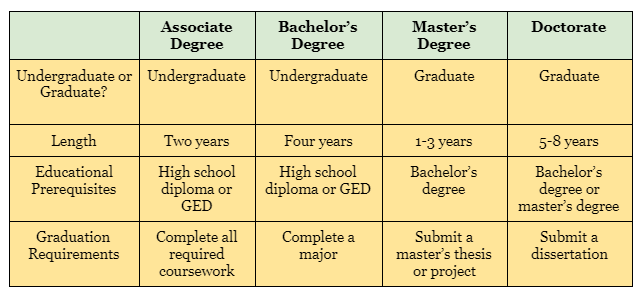Associate Degree vs. Bachelor’s Degree: Which One is Right for You?
Choosing between an Associate Degree and a Bachelor’s Degree is a crucial decision and one of the most important academic choices you’ll make. Each degree has its pros and cons. An Associate Degree offers ease in terms of cost and time, while a Bachelor’s Degree provides greater future prospects. However, a Bachelor’s Degree might not be suitable for everyone.
Each degree has its own benefits, career opportunities, and pathways for further education. Whether you’re looking for an affordable education, a quicker route to employment, or a specialized field of study, understanding the differences can help you make the best choice for your future.
In this guide, we’ll cover everything you need to know—from program durations and costs to career prospects and transfer options—so you can confidently decide which degree is right for you.
Understanding Associate and Bachelor’s Degrees
What is an Associate Degree?
An Associate Degree is a two-year undergraduate program typically offered by community colleges, technical schools, and some universities. It serves as a stepping stone to a career or a pathway to a Bachelor’s Degree. Associate Degrees are available in a wide range of fields, and admissions to these programs are often more accessible, as community colleges and technical schools generally have less stringent criteria.
Types of Associate Degrees
- Associate of Arts (AA): Focuses on humanities, social sciences, and liberal arts.
- Associate of Science (AS): Concentrates on mathematics, science, and technical fields.
- Associate of Applied Science (AAS): Career-focused, leading directly to employment rather than transfer to a bachelor’s program.
Benefits of an Associate Degree
- Lower tuition costs: Community colleges are more affordable than four-year universities.
- Faster entry into the workforce: You can complete your degree in just two years and enter the job market sooner. This is particularly beneficial for those with limited family income who want to start earning early.
- Flexible learning options: Many programs offer online or evening classes, allowing you to complete your degree on a schedule that suits your needs. In contrast, four-year degree programs often require full dedication, leaving little time for other activities.
- Easy admission: Community colleges and technical colleges typically have less stringent admission criteria.
- Pathway to a bachelor’s degree: After completing an associate degree program, you can transfer credits to a four-year university program. This means an associate degree doesn’t block your path to higher education—it actually provides a stepping stone while giving you time to adjust to academic life.
- High-paying jobs available: Many careers that require an associate degree offer competitive salaries.
Career Opportunities with an Associate Degree
Many students choose an Associate Degree because it offers quicker access to the workforce with minimal debt. Some high-paying jobs with an Associate Degree include:
- Registered Nurse (RN): Median Salary: $77,600/year
- Paralegal: Median Salary: $56,230/year
- Web Developer: Median Salary: $78,300/year
- Dental Hygienist: Median Salary: $77,090/year
- Air Traffic Controller: Median Salary: $129,750/year
Best Associate Degree Programs
- Computer Science
- Nursing
- Business Administration
- Criminal Justice
- Cybersecurity
- Healthcare Administration
- Graphic Design
What is a Bachelor’s Degree?
A Bachelor’s Degree is a four-year undergraduate program offered by universities and colleges. It provides in-depth knowledge in a chosen field and opens up more career opportunities compared to an Associate Degree. Bachelor’s degrees are offered by top-ranked universities, giving you the option to study at renowned institutions and learn from leading professors.
Additionally, the funding and infrastructure at these institutions are unparalleled. You gain access to the latest technologies, utilize the best resources, and ensure you are well-equipped to meet the latest trends and challenges in the global job market.
Types of Bachelor’s Degrees
Bachelor’s degrees are offered in a wide range of fields, providing perhaps the most diverse options among degree programs. Typically, there are three main types of bachelor’s degrees:
- Bachelor of Arts (BA): Focuses on liberal arts, humanities, and social sciences.
- Bachelor of Science (BS): Emphasizes science, technology, engineering, and mathematics (STEM) fields.
- Bachelor of Fine Arts (BFA): Specializes in visual and performing arts.
Bachelor’s Degree Requirements
- Completion of general education courses.
- Specialized courses in a chosen major.
- Internships or practical experience in some fields.
- Minimum GPA requirements for graduation.
Why Choose a Bachelor’s Degree?
- Higher Earning Potential: Bachelor’s degree holders earn, on average, 67% more than those with only a high school diploma. This is because the four-year program provides dedicated time to master a subject, and institutions offer top-tier resources to prepare students for the job market.
- Career Advancement: Nearly all management roles require a bachelor’s degree. In today’s job market, it is virtually impossible to secure a managerial position without one. Exceptions are rare—perhaps one in a million—and typically apply only to business owners or individuals with over a decade of experience in traditional industries.
- Networking Opportunities: Universities provide access to extensive alumni networks and internships. They also organize career fairs and open houses, inviting employers to campus for recruitment opportunities.
Career Opportunities with a Bachelor’s Degree
A Bachelor’s Degree offers more career advancement opportunities, often leading to leadership roles and higher salaries. Some of the best high-paying jobs include:
- Software Engineer: Median Salary: $110,140/year
- Marketing Manager: Median Salary: $135,030/year
- Financial Analyst: Median Salary: $81,730/year
- Biomedical Engineer: Median Salary: $97,410/year
- Human Resources Manager: Median Salary: $126,230/year
Best Bachelor’s Degrees
- Computer Science: High demand for software developers and data scientists. Median salary: $126,830/year.
- Nursing (BSN): Registered nurses earn a median salary of $81,220/year.
- Business Administration: Opens doors to roles like marketing manager (median salary: 140,040/year)
Best Colleges for a Bachelor’s Degree
Some of the top-ranked universities for undergraduate programs include:
- Harvard University: Best for business and social sciences.
- Massachusetts Institute of Technology (MIT): Best for STEM fields.
- Stanford University: Best for entrepreneurship and innovation.
- University of California, Berkeley: Best for public education.
- University of Pennsylvania: Best for finance and law.
Key Differences: Associate vs. Bachelor’s Degree
| Feature | Associate Degree | Bachelor’s Degree |
| Duration | 2 years | 4 years |
| Cost | Lower ($3,800/year avg.) | Higher ($9,400/year avg. for in-state public universities) |
| Career Opportunities | Entry-level jobs | Higher-paying positions |
| Transfer Options | Can transfer to a bachelor’s program | Not transferable |
| Earning Potential | Median salary: ~$50,000/year | Median salary: ~$75,000/year |
1. Duration
- Associate Degree: Typically takes 2 years to complete. It’s often offered at community colleges and focuses on foundational knowledge or specific technical skills.
- Bachelor’s Degree: Usually requires 4 years of study at a university. It provides a more in-depth education, including general education courses and specialized major requirements.
2. Cost
- Associate Degree: More affordable! Community colleges often have lower tuition fees, making this a great option for students on a budget.
- Bachelor’s Degree: More expensive due to longer duration and higher tuition costs. However, scholarships, grants, and financial aid can help offset expenses.
3. Career Opportunities
- Associate Degree: Prepares you for entry-level positions in fields like healthcare, IT, and business. Examples include roles like dental hygienist, web developer, or paralegal.
- Bachelor’s Degree: Opens doors to higher-paying careers and leadership roles. Think software engineer, registered nurse, or marketing manager.
Transferring from an Associate to a Bachelor’s Program
If you’re unsure about committing to a four-year degree, you can start with an Associate Degree and transfer to a Bachelor’s program later. Many community colleges offer transfer agreements, also known as 2+2 programs, allowing students to complete two years at a community college before transferring to a university.
Steps to Transfer
- Choose a Transfer-Friendly Associate Degree: Look for programs labeled “transfer pathways.”
- Maintain a Good GPA: Most universities require a minimum GPA of 2.5-3.0 for transfer students.
- Meet with an Academic Advisor: Ensure you’re taking the right courses that will transfer.
- Apply to a Partner University: Many universities have direct transfer agreements with community colleges.
- Transfer Credits: Submit transcripts to ensure your credits are accepted.
Choosing the Right Degree for You
When to Choose an Associate Degree
- You want to enter the workforce quickly.
- You need a more affordable education option.
- You’re not sure about committing to a four-year program.
- You want to transfer later to a Bachelor’s Degree.
When to Choose a Bachelor’s Degree
- You want more career opportunities and higher salary potential.
- Your desired job requires a four-year degree.
- You’re interested in leadership roles in your industry.
- You’re committed to completing a full undergraduate program.
Both Associate and Bachelor’s Degrees offer unique advantages depending on your career goals, financial situation, and time commitment. If you need a quicker, more affordable entry into the workforce, an Associate Degree may be your best option. However, if you’re looking for broader career opportunities, higher salaries, and leadership roles, a Bachelor’s Degree is the way to go.
Still unsure? Speak to an academic advisor or research universities that offer flexible transfer programs to make the best decision for your future!
FAQs
How much does an Associate Degree cost compared to a Bachelor’s Degree?
- Associate Degree: Average cost is around $3,800 per year at a community college.
- Bachelor’s Degree: Average cost is around $9,400 per year for in-state public universities and significantly higher for private institutions.
Can I get a high-paying job with an Associate Degree?
Yes! Many high-paying jobs only require an Associate Degree, such as:
- Radiation Therapist: $86,850/year
- Dental Hygienist: $81,400/year
- Air Traffic Controller: $129,750/year
What are the best Associate Degree programs?
Some of the top programs include:
- Computer Science
- Nursing
- Business Administration
- Cybersecurity
- Healthcare Administration
Can I transfer from an Associate Degree to a Bachelor’s Degree?
Yes! Many community colleges have transfer agreements with universities, allowing you to complete two years at a community college and then transfer to a four-year program.
How do I transfer credits from an Associate Degree to a Bachelor’s Degree?
Follow these steps:
- Choose a transfer-friendly Associate Degree program.
- Maintain a strong GPA (usually 2.5-3.0 or higher).
- Work with an academic advisor to ensure your credits will transfer.
- Apply to a partner university with a transfer agreement.
What is the earning potential for Associate Degree vs. Bachelor’s Degree holders?
- Associate Degree: Median salary is around $50,000/year.
- Bachelor’s Degree: Median salary is around $75,000/year.
What is the difference between an AA, AS, and AAS degree?
- AA (Associate of Arts): Focuses on liberal arts and humanities.
- AS (Associate of Science): Emphasizes math, science, and technical fields.
- AAS (Associate of Applied Science): Career-focused, designed for immediate employment.
Can I get financial aid for an Associate Degree?
Yes! Financial aid options include:
- Federal Pell Grants
- State Grants
- Scholarships
- Work-Study Programs
What are the top community colleges for Associate Degrees?
Some of the best include:
- Houston Community College (HCCS)
- City University of New York (CUNY)
- Santa Monica College
- Miami Dade College
Is an Associate Degree worth it?
Yes! An Associate Degree is worth it if you:
- Want to start working quickly.
- Need an affordable education option.
- Are unsure about committing to a four-year program.
- Plan to transfer to a Bachelor’s program later.
Is a Bachelor’s Degree worth it?
Yes! A Bachelor’s Degree is worth it if you:
- Want higher earning potential.
- Are aiming for specialized or leadership roles.
- Plan to pursue graduate studies.
How do I decide which degree is right for me?
Consider the following:
- Career Goals: What jobs are you interested in?
- Budget: How much can you afford for tuition?
- Time Commitment: Do you want to start working in 2 years or 4 years?
- Long-Term Plans: Do you plan to pursue advanced degrees?
Can I switch from a Bachelor’s Degree to an Associate Degree?
While it’s less common, you can switch if you find that a shorter program better suits your goals. However, you may lose some credits in the process.
What is the job market like for Associate Degree holders?
The job market is strong for Associate Degree holders, especially in fields like healthcare, IT, and skilled trades. Many industries face shortages of qualified workers, making it a great time to enter the workforce.
Can I complete an Associate Degree online?
Yes! Many community colleges and online schools offer Associate Degree programs that can be completed entirely online.
Can I complete a Bachelor’s Degree online?
Yes! Many universities offer online Bachelor’s Degree programs, especially in fields like business, IT, and healthcare.
What are the best resources for finding Associate Degree programs?
- Community College Websites: Check local community colleges for program details.
- College Board: Use their search tool to find programs.
- U.S. Department of Education: Explore accredited schools and programs.
What are the best resources for finding Bachelor’s Degree programs?
- University Websites: Research programs at top universities.
- College Rankings: Use rankings from U.S. News & World Report or Forbes.
- College Fairs: Attend events to learn about different schools.
How do I apply for financial aid?
- Complete the Free Application for Federal Student Aid (FAFSA).
- Research scholarships and grants through your school or external organizations.
- Contact your school’s financial aid office for guidance.
What if I can’t decide between an Associate and Bachelor’s Degree?
- Start with an Associate Degree to save money and explore your interests.
- Talk to an academic advisor or career counselor for personalized advice.
- Consider your long-term goals and financial situation.
Meta Description: Struggling to choose between an associate degree and a bachelor’s degree? This comprehensive guide breaks down the differences, benefits, and career opportunities for each, helping you make the best decision for your future.



